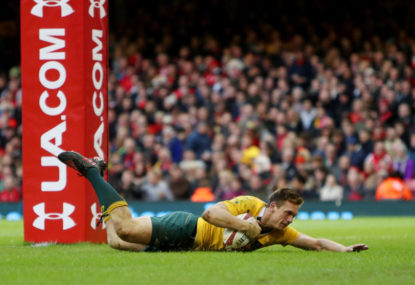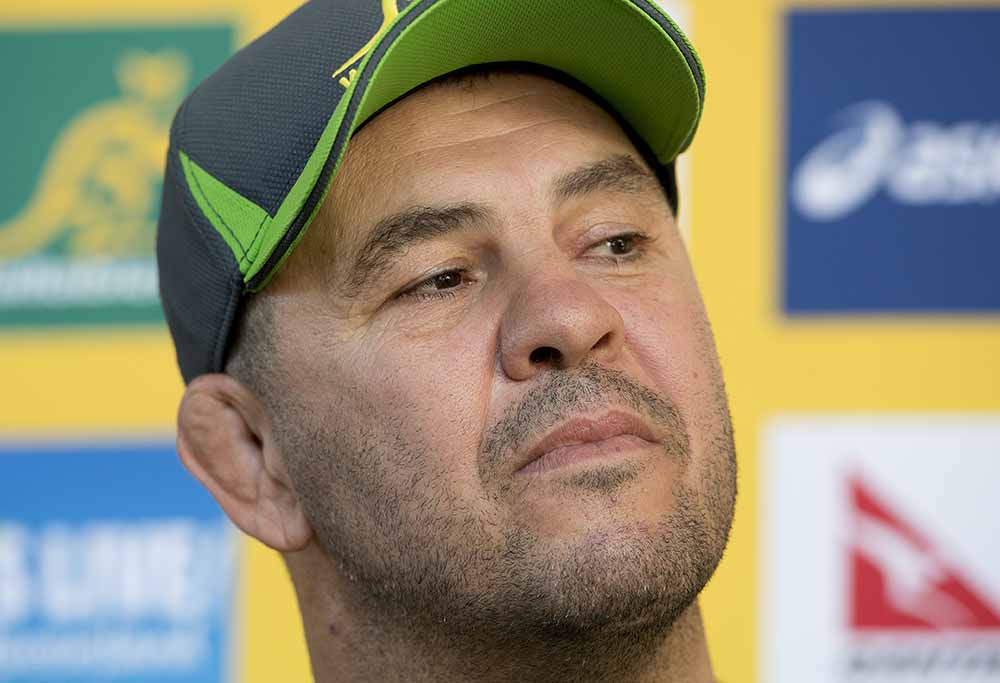Expert

What is it with Scotland and the Wallabies? On face value there is a distinct difference in class between the two sides, yet since 2009, in the last five meetings, the winning margin has been one, one, six, three and one.
The ledger is now 3-2 in Australia’s favour.
Just as in last year’s World Cup quarter-final, fans were treated to a cracking contest, in doubt right until the final whistle. Although this occasion less controversial, as referee John Lacey was not feeling the need to emulate Craig Joubert’s hasty dash to the sanctuary of the referee’s room.
Wet weather anticipated earlier in the week didn’t materialise, Murrayfield providing a perfect surface, which Scotland took advantage of early, clearly up for the contest.
Sekope Kepu then blew a chance for a Wallabies try; impatience and loose hands unfortunately setting the scene for others to follow throughout the match. Much of this was due to Scotland’s combativeness, not allowing the Wallabies the time and space that Wales had gifted last week.
And so without the same speed of recycle, and only a confined space in which to work, both Will Genia and Bernard Foley largely struggled to assert the authority they might have anticipated.
The effectiveness of the Wallabies clean-out was noticeably diminished as well, due in large part to the early loss of Adam Coleman. The sight of him sideline with crutches does not bode well for the Wallabies’ immediate future; replacement Rob Simmons struggling to match Coleman’s physicality, and Will Skelton providing the physicality, but only in a manner that would have him contending for a ‘Darwin Award.’

Centre Huw Jones, he of Welsh name, English schooling, South African rugby development and, crucially, Scottish birth, took his two first half tries superbly; keeping Scotland’s nose ahead throughout the match and the prospect of an upset very real.
Tevita Kuridrani would have been very disappointed with his defensive effort for Jones’ second try, although he would later redeem himself in spectacular fashion, planting the ball down next to the posts in the 75th minute, to seal the comeback win.
Despite all of Scotland’s good work, their willingness to take the attack to Australia – even if it was often a little lateral or else one-out – they remain their own worst enemy. Their kick-off receipts were appalling, and they lacked a consistent, convincing exit strategy; particularly telling in the last ten minutes, when their numerical advantage should have provided them with better field position.
Scottish halfback Greig Laidlaw must be feeling particularly rueful today, his final conversion hitting the post and staying out; ultimately the margin between victory and defeat. But in reality, Scotland lost because they lacked the self-belief that Ireland showed against the All Blacks; to own the match when it was there to be owned.
On the other hand, with Skelton demonstrating that swearing off sugar does strange things to a person’s state of mind, the Wallabies turned potential adversity into triumph with a totally convincing final ten minutes.
Coach Michael Cheika got it dead right by not replacing captain Stephen Moore. He was playing well and this was a time for an on-field leader to take control, not to be swapped for a pre-ordained ‘finisher’.
The try, and with it the lead, duly came, and then the Wallabies braced themselves for Scotland’s helter-skelter finish; the final play comprising no less than 19 phases. Too many of these however lacked enough forward punch to truly test the Wallabies defence, Scotland simultaneously running out of petrol and ideas, and dissolving over the sideline.
If the Wallabies are to go on and claim a grand slam, they will take comfort from history, which shows that these are achieved not by rampaging, flowing wins in four matches, but through attrition, and sneaking a game or two that could easily have gone the other way.
Even the celebrated 1984 grand slam side had one of those days; against Ireland, needing a late Mark Ella score to win.
In that context, this win may well provide Cheika with more satisfaction and value than last week’s romp in Cardiff; although the squad will be under no illusion that the two toughest opponents, plus a diversion to France, lie ahead of them.

Meanwhile, in Rome, New Zealand edged one game closer to matching their world record 18 consecutive wins, trouncing Italy 68-10.
Several things were noticeably different from Chicago; the All Blacks benefitting from having a ‘proper’ second row, and also a demonstrably weaker opponent. Scott Barrett is only two games into his All Black career, but looks to have the same soft hands and subtle ball skills of Brodie Retallick, which suits perfectly the All Black’s game.
Other beneficiaries were prop Wyatt Crockett, who had a field day in midfield, and Elliot Dixon, who enjoyed himself as the game opened up in the second half. The match also marked the debut Test try for 19 year old Reiko Ioane; one suspects that there will be many more to follow.
Interestingly, BT Sport comments man Glenn Delany compared the offloading of Anton Leinert-Brown to the “great Canterbury-Bankstown rugby league legend”, Jim Dymock. No disrespect to Dymock, who enjoyed a fine career, but I wouldn’t be surprised to learn that Leinert-Brown has other role models in mind when he pulls on his Test jersey.
All in all, a much needed stop for the All Blacks, away from the intensity of last week, and a chance to get good minutes into a number of players and to take a breath before refocusing back on the emerald green.
For their part, Italy remain an enigma; capable of putting together some good rugby, but lacking impact players and sharp decision makers. Too much of their kicking was loose and aimless; cannon fodder for the All Black’s back three.
Twickenham saw Prince Harry accompanied by a blonde woman, Princess Charlene of Monaco, who most definitely was not new actress girlfriend Meghan Markle; who is apparently keen to keep a much lower profile than the tabloid media has in mind.
Another blonde, Pieter Steph du Toit, stripped the world’s tallest No.7, alongside Lood de Jager, the world’s most baby faced lock, whose new beard curiously only served to make him look even younger.
Springbok’s coach Allister Coetzee may have been disappointed to find that stacking his lineout did nothing to fix South Africa’s backline defensive woes; Jonny May scoring from first-phase lineout chain passing. Then in the second half, England halfback Ben Youngs was shown the fast lane, for two tries to the inside backs, du Toit looking like the fish out of water he was, in the process.
While the result was clear cut – England were far better organised, better balanced between back and forward, and more penetrative – it was interesting to note the interaction between referee Jerome Garces and his TMO Jon Mason, over the tries to England’s Courtney Lawes and South Africa’s Johan Goosen.
On another day, and certainly in pre TMO times, both of these tries could easily have been ruled out; the naked eye and intuition suggesting a Mike Brown knock-on before Lawes’ force, and a push forward out of the hands of AJ Venter to Warren Whiteley.
It was fascinating to observe the technology on one hand being used repeatedly to prove that Brown somehow didn’t get a fingernail onto the ball, yet on the other hand, seemingly ignored with respect to Venter’s forward pass.
I can only wonder what Wayne Barnes made of it all?
With the match effectively dead, my favourite moment came at the end, replacement halfback Faf du Plessis, going in to clean out England’s replacement prop Kyle Sinckler at a breakdown and shifting him… not a centimetre.
The fourth SANZAAR side, Los Pumas, made a hash of their match against an improved Wales, losing 20-24. The world cup semi-finalists fell into the inevitable trap that everyone who watches them can see, yet the players seem unable to avoid, time and time again; poor discipline.
The thing about Argentine rugby is that all players are equally culpable. At least Will Skelton can count himself lucky that he had 14 teammates prepared to roll up their sleeves and keep the Wallabies’ 2016 grand slam dream alive.